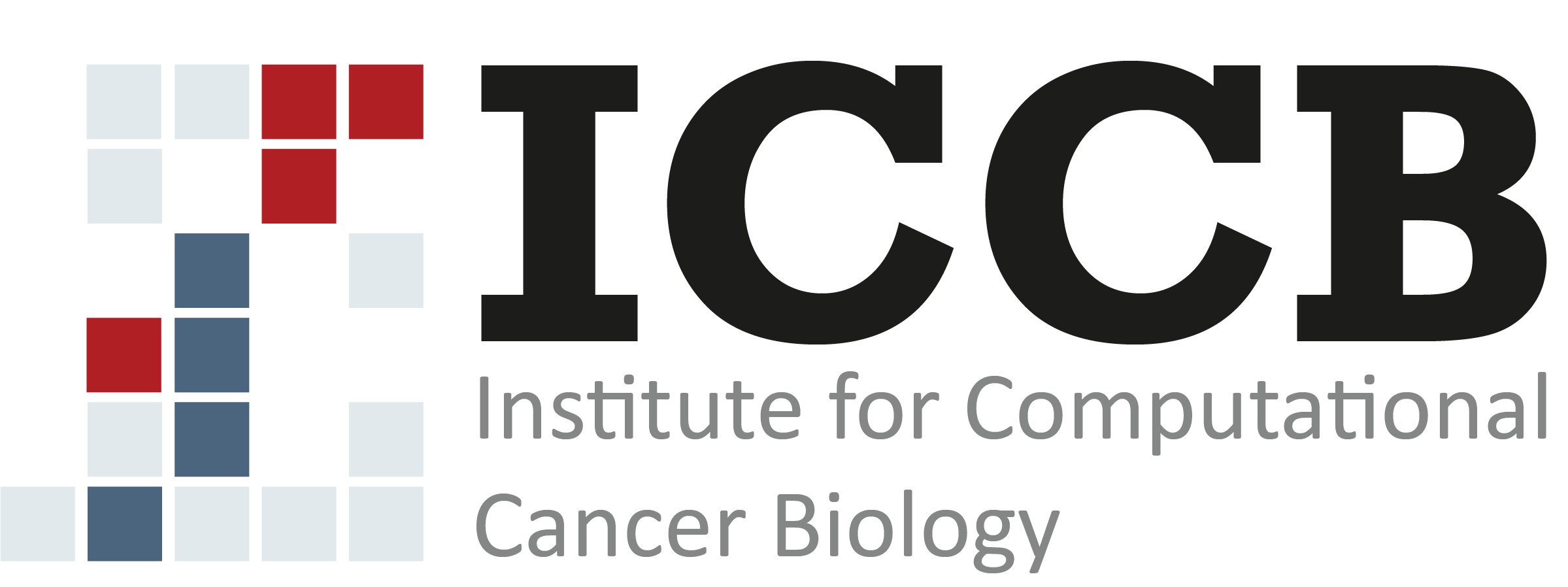Our Research

We are interested in the development of approaches that support the molecular characterisation of patient cohorts. With extensive experience in the analysis of diverse types molecular data, the focus lies within integrative approaches, which can holistically harness additional insights into disease mechanisms.
The group is also involved in the analysis of cohort level data of cancer patients. A particular interest here is to apply our developments to enable new views on existing data that have the potential to make real-world impact by being translated into clinical applications.
Locations

We are positioned for collaborative research within the interdisciplinary Cancer Center Cologne Essen network at the Uniklinik RWTH Aachen.
The Cancer Center Cologne Essen (CCCE) was established to lead cancer medicine in Northrhine-Westphalia (NRW) to an international top level. The CCCE joins the forces of the two Medical Faculties (MF) and University Hospitals (UH) in Cologne and Essen with internationally visible and complementary expertise in clinical and translational cancer research. Both CCCE sites are designated Oncology Centers of Excellence of the Deutsche Krebshilfe (DKH), the of Integrated Oncology (CIO) Cologne and the West German Cancer Center (WTZ) Essen. The UH Essen is partner site of the German Cancer Consortium (DKTK). Following a highly competitive scientific review process, the CCCE was selected as one candidate of the in total six sites of the extended National Center for Tumor Diseases (NCT) sponsored by the BMBF.
News
Research
Publications
Key publications
Bunne C, Stark SG, Gut G, del Castillo JS, Levesque M, Lehmann K-V, et al.. Learning single-cell perturbation responses using neural optimal transport. Nature Methods (2023).
▶ CellOT is a framework for learning the response of individual cells to a given perturbation by mapping the unpaired distributions of perturbed or non-perturbed cells.
Lehmann K, Kahles A, Murr M, Ratsch G. RNA Instant Quality Check: Alignment-Free RNA-Degradation Detection. Journal of Computational Biology (2022).
▶ RNA degradation assessment by alignment-free computing the 5′/3′ bias based on all genes.
PCAWG Transcriptome Core Group, Calabrese C, Davidson NR, Demircioğlu D, Fonseca NA, He Y, Kahles A, Lehmann K-V, ...,Brazma A*, Brooks A*, Göke J*, Rätsch G*, Schwarz RF*, Stegle O*, Zhang Z*. Genomic basis for RNA alterations in cancer. Nature (2020).
▶ We contributed to the analysis of somatic mutations and their effects on gene expression as part of the PCAWG consortium.
People
Meet the Team

Group Leader
Dr. Kjong Lehmann
My background is in bioinformatics and computational biology with a strong interest in quantative modeling and the analysis of large scale molecular data.
Research
I am interested in building new models for data integration and in the data analysis of molecular data of cancer patients. As the computational biology subteam lead of the Tumor Profiler consortium I am actively working and coordinating the development of scalable approaches to integrate single cell measurements and train predictive models that enable the in-depth analysis of patient data in order to derive clinically relevant insights. I am especially excited about development of new approaches for the analysis of mutational signatures and have joined the ICGC-ARGO mutational signature working group.
Scientific Background
I attained my undergraduate degree in bioinformatics from the Friedrich-Schiller-University in Jena, Germany. During this time, I attended a summer research program program at Forschungszentrum Juelich working on scalable parameter estimation methods. I received my PhD in Computational Biology from the University of Southern California, developing a variant interpretation approach for non-coding variants as well as working on linear mixed models to analyze transcriptome data. In 2013, I joined the Rätsch group at Memorial Sloan Kettering Cancer Center in New York contributing towards large-scale cancer genomics efforts such as TCGA PanCanAtlas and ICGC Pan-Cancer Analysis of Whole Genomes Working Group.
Postdoc
Dr. Arnab Chakrabarti
Research
I am interested in
- High dimensional data analysis
- Visualization and visual analytics
- Data lake and data spaces
- Data management, data engineering, data integration and metadata management
Scientific Background
I received my engineering (B.Sc) degree in Computer Science in 2010 from West Bengal University of Technology, Kolkata (India) and my master's degree in Computer Science (Software Systems Engineering) in June 2013 from RWTH Aachen University. I worked as a research assistant in the Life Science Informatics group at the Fraunhofer Institute for Applied Information Technology (FIT) in St. Augustin, Germany from July 2015 to June 2019. Afterwards, I worked as a research assistant and a PhD student at the Chair for Computer Science 5 at RWTH Aachen University. During this time, I also held the position of the Study Coordinator for the international Master's programme Media Informatics jointly offered by RWTH Aachen University and BiT Bonn.

Bioinformatician
Lancelot Seillier
Research
I am interested in large scale multi-omics studies to uncover hollistic models investigating multi-organ diseases, oncogenesis and evolution in cancer. Furthermore, I am interested in optimizing and streamlining data analysis, ensuring data quality and facilitating interpretation of cancer sequencing data in the clinical context.
Scientific Background
I received my Master's Degree in Biology in 2019 at the Institute for Botanic and Molecular Genetics of the RWTH Aachen University, where I used Nanopore long-read and Illumina short-read sequencing to help reconstructing the reference genome of a polyploid potato cultivar. This further sparked my interest in Omics and led me to join the Institute of Pathology of the RWTH University clinic, where I focused on reconstructing the clonal composition of bladder cancer for clinical application in cooperation with the Peifer Lab in Cologne from 2019 to 2022. I am working as a bioinformatician and analyst for multiple cooperative projects, including the DNPM initative and the CIO-ABCD, helping in analyzing cancer sequencing data.
Bioinformatician
Ruichao Wang
Research
I am interested in the application of machine learning and statistics for the biomarkers identification and predictive model development based on large scale data. Currently, I am focusing on the analysis of mutational signatures in order to identify the patterns and build predictive models in cancer samples. Also, I am interested in other bioinformatics topics like gene fusion analysis.
Scientific Background
My background is in molecular epidemiology, bioinformatics and data science and I am very interested in the application of machine learning and statistics for molecular data analysis. I received my Master's degree in bioinformatics in 2015 from the Shanghai Institutes for Biological Sciences, Chinese Academy of Sciences (CAS), during which I identified several gene mutation signatures related to the metastasis of colon cancer based on RNA-seq data. In 2016, I started my Doctoral program which focused on the metabolomics data analysis for the risk prediction of prediabetes and type 2 diabetes at Helmholtz Zentrum Muenchen / Ludwig Maximilian University of Munich.
Visitors

Open and Reproducible Data Science Expert
Dr. Heidi Seibold

Consortium
TuPro
We are part of the Tumor Profiler (TuPro) consortium.



